This article has been reviewed according to Science X's editorial process and policies. Editors have highlighted the following attributes while ensuring the content's credibility:
fact-checked
reputable news agency
proofread
German town bids farewell to nuclear, eyes hydrogen future
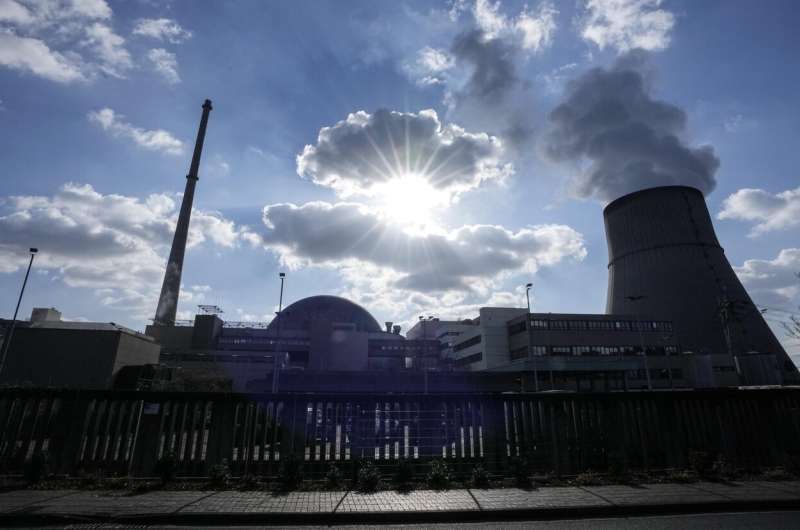
For 35 years, the Emsland nuclear power plant in northwestern Germany has reliably provided millions of homes with electricity and many with well-paid jobs in what was once an agricultural backwater.
Now, it and the country's two other remaining nuclear plants are being shut down. Germany long ago decided to phase out both fossil fuels and nuclear power over concerns that neither is a sustainable source of energy.
The final countdown Saturday—delayed for several months over feared energy shortages because of the Ukraine war—is seen with relief by Germans who have campaigned against nuclear power.
Yet with energy prices stubbornly high and climate change a growing concern, some in the country and abroad are branding the move reckless. As Germany closes nuclear stations, other governments in Europe have announced plans to build new ones or have backtracked on commitments to shut down existing plants.
"The Emsland nuclear power plant has indeed contributed significantly to the economic development of this region," says Albert Stegemann, a dairy farmer and lawmaker for the opposition Christian Democrats who represents the nearby town of Lingen and surrounding areas in the federal parliament.
Unlike some of his conservative colleagues, Stegemann isn't worried the lights will go out in Germany when the three reactors—Emsland, Neckarwestheim II and Isar II—are switched off for good. The closure of three other plants in late 2021 reduced nuclear's share of electricity produced in Germany to about 5% but didn't result in any blackouts.
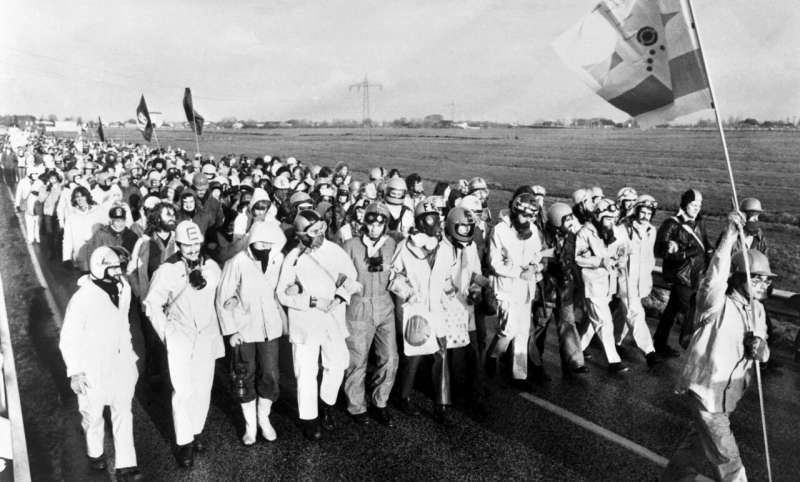
The 47-year-old is also realistic about the lack of support the technology has among German voters, though he insists the vast majority of people in Lingen supported the plant.
"In the long term, nuclear power is certainly not the technology of the future. But at this time it would have been good to be able to rely on it," he said.
Against the backdrop of the Russian attack on Ukraine and the challenges of climate change "it would have been wise to think about (delaying the shutdown) another one, two or three years," Stegemann said.
"Politicians need to adjust to changed circumstances," he added. "And I accuse the government of not doing that at all."
Similar concerns have been raised in other quarters.
"Right now, existing nuclear plants are a critical source of carbon-free baseload energy," said Peter Fox-Penner, previously a senior official at the U.S. Department of Energy and now with the Boston University Institute for Sustainable Energy. "Energy efficiency, wind, and solar energy will soon become dominant sources, but in the meantime, it is wisest to continue to run existing nuclear," as long as safety is the priority, he said.
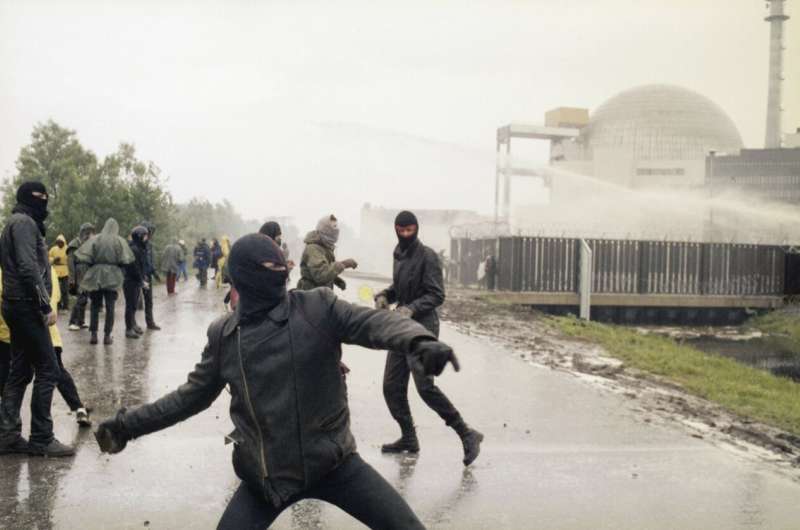
The government of German Chancellor Olaf Scholz has made clear, however, that a further extension isn't in the cards.
"Nuclear power remains a risky technology, and in the end, the risks can't be controlled even in a high-tech country like Germany," Environment Minister Steffi Lemke said at a news conference ahead of the shutdown.
She cited the disaster at Japan's Fukushima atomic power plant in 2011, when a tsunami knocked out the power supply leading to a catastrophic meltdown, evoking memories of the 1986 disaster at Chernobyl that remains a pivotal event for Germany's anti-nuclear movement.
While Lemke's environmentalist Green party is most closely linked to that movement, it was former Chancellor Angela Merkel—then leader of Stegemann's Christian Democrats—who pulled the plug on atomic energy in Germany following Fukushima. The decision led to a greater reliance on fossil fuels that has kept Germany's greenhouse gas emissions stubbornly high compared to neighbors such as atom-friendly France.

At Lingen's modern town hall, Mayor Dieter Krone said there are mixed feelings about the imminent nuclear shutdown, which will be marked with a small, closed-doors ceremony inside the plant.
"For the staff, it will be a moment of sadness" he said, noting that Emsland has safely produced electricity for Germany and its neighbors for decades. "On the other hand, it's the start of a new era because we want to get into hydrogen."
For the past 12 years, Krone and others have worked to convince public and private partners to invest in what they hope will be a key green fuel of the future. The region already produces more renewable energy than it consumes and aims to become a hub for hydrogen production using wind and solar power in the coming years.
"We have the big advantage that all the infrastructure, the networks, are there," he said.
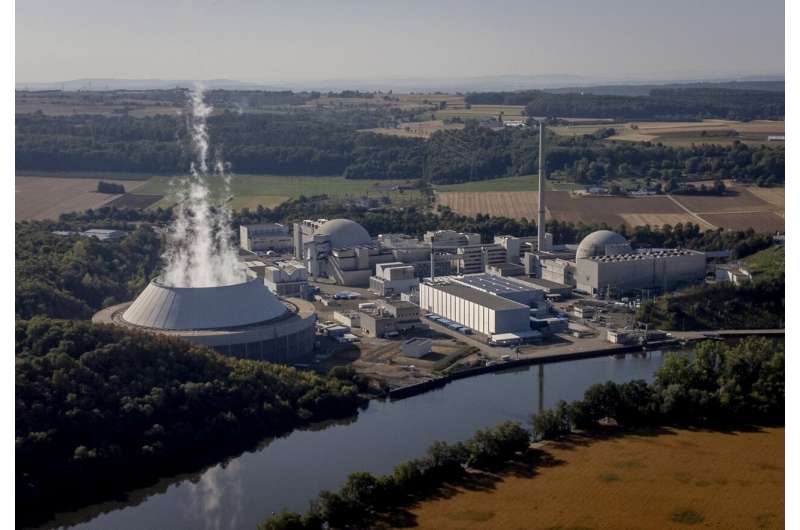
One of the world's biggest clean hydrogen production facilities is due to begin operating in Lingen this fall. Some of it will be used to make "green steel," a vital step if Europe's biggest economy wants to become carbon neutral by 2045.
"I believe we are going to become the biggest and most significant location in Germany for hydrogen," Krone said. "As such, I do think we can say this is a kind of blueprint for development."
Critics have warned that without nuclear power, Germany will have to rely on dirty coal and gas plants for energy during periods of overcast but calm weather—a condition for which Germans have even coined a new term, Dunkelflaute.
The government has dismissed such concerns, arguing that thanks to Europe's integrated electricity network, Germany can import energy when needed while remaining a net exporter.
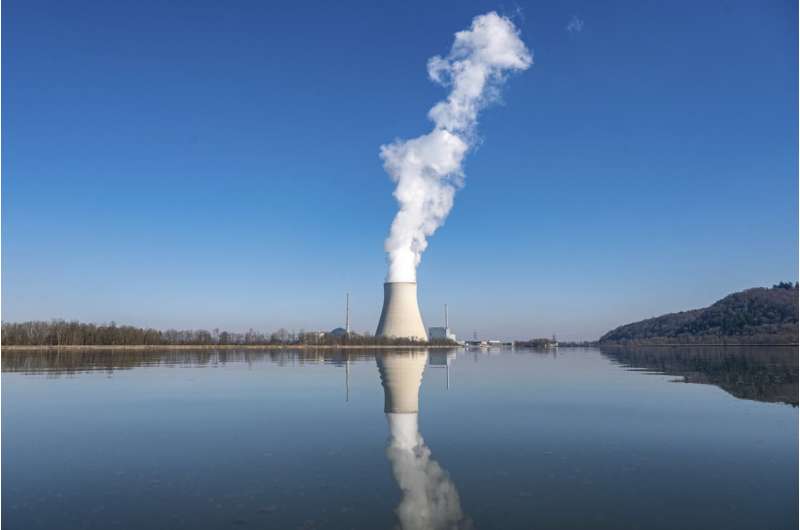
Lemke has brushed aside suggestions that Germany's no-nuclear policy will hamper efforts to cut the country's emissions.
"The expansion of renewables remains the cheaper and in particular faster path if we want to achieve the climate goals," she told reporters in Berlin earlier this month, pointing to significant delays and cost overruns in the construction of nuclear power plants elsewhere in Europe.
Meanwhile, the price of installing solar and wind energy has dropped significantly in recent years, a trend that is expected to continue.
Back in Lingen, activist Alexander Vent of the anti-nuclear group AgIEL says the shutdown isn't the end of the road for their efforts.
"We want to stop and commemorate this day. Of course it's a reason to celebrate," he said. "But for us it's basically a milestone that's been reached. We now need to look forward because we see there's still a lot left to do."
-
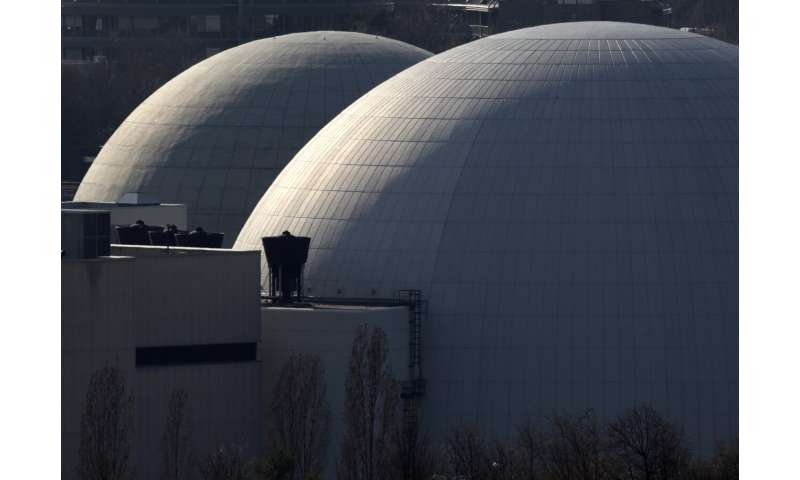
The nuclear plant of Neckarwestheim, southern Germany is pictured on March 15, 2011. Germany is shutting down this nuclear power plant and two others on Saturday, April, 2023, as part of an energy transition agreed by successive governments. Credit: AP Photo/Michael Probst, File -

A demonstrator with puppets on his backpack attends a protest demand to shut down nuclear power plants in Berlin on Tuesday, May 17, 2011. Germany is shutting down its last three nuclear power plants on Saturday, April 15, 2023, as part of an energy transition agreed by successive governments. The final countdown, delayed for several months over feared energy shortages because of the Ukraine war, is seen with relief by Germans who have campaigned against nuclear power. Credit: AP Photo/Markus Schreiber, File -

A man with a gas mask protests near the chancellery against nuclear power in the wake of Japan's Fukushima reactor disaster in Berlin, March 26, 2011. The country's three remaining reactors are being shut down, because Germany long ago decided to end nuclear power due to its potential for catastrophic meltdown and long-term radioactive legacy while simultaneously phasing out fossil fuels over climate change.Credit: AP Photo/Markus Schreiber, File -

Bucket wheel excavators mine coal at the Garzweiler open-cast coal mine in Luetzerath, Germany, Oct. 25, 2021. Germany is shutting down its last three nuclear power plants on Saturday, April 15, 2023, as part of an energy transition agreed by successive governments. Critics have warned that without nuclear power, Germany will have to rely on dirty coal and gas plants for energy during periods of overcast but calm weather. Credit: AP Photo/Michael Probst, File -
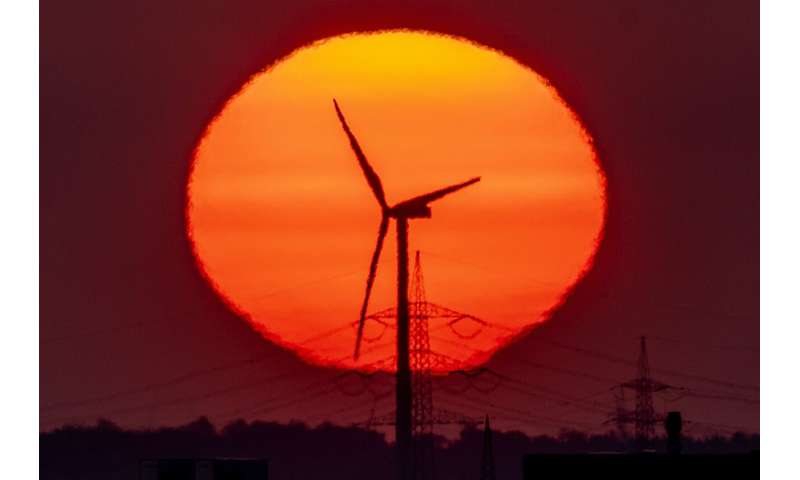
A wind turbine works in front of the rising sun in Frankfurt, Germany, May 9, 2022. Germany is shutting down its last three nuclear power plants on Saturday, April 15, 2023, as part of an energy transition agreed by successive governments and the price of installing solar and wind energy has dropped significantly in recent years. Credit: AP Photo/Michael Probst, File -

Mining debris covers the ground of a lignite coal pit near the village of Welzow in the Lusatia (Lausitz) area in Germany, June 5, 2018. Germany is shutting down its last three nuclear power plants on Saturday, April 15, 2023, as part of an energy transition agreed by successive governments. Critics have warned that without nuclear power, Germany will have to rely on dirty coal and gas plants for energy during periods of overcast but calm weather. Credit: AP Photo/Markus Schreiber, File -
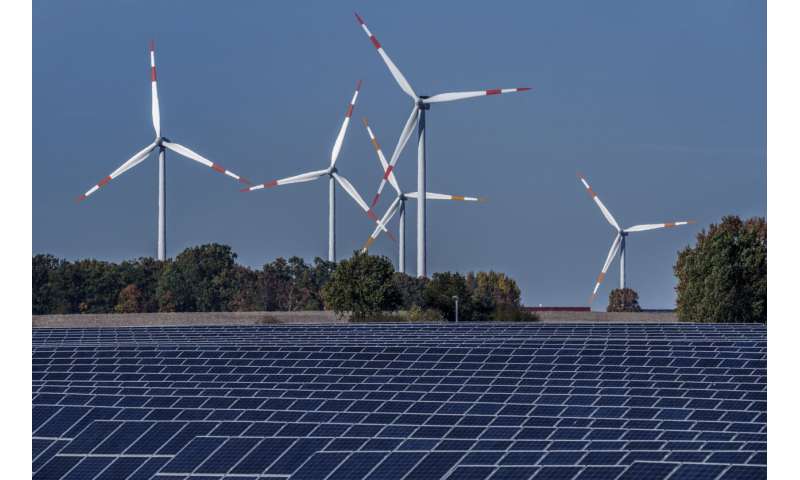
Wind turbines turn behind a solar farm in Rapshagen, Germany, Oct. 28, 2021. Germany is shutting down its last three nuclear power plants on Saturday, April 15, 2023, as part of an energy transition agreed by successive governments and the price of installing solar and wind energy has dropped significantly in recent years. Credit: AP Photo/Michael Sohn, File -
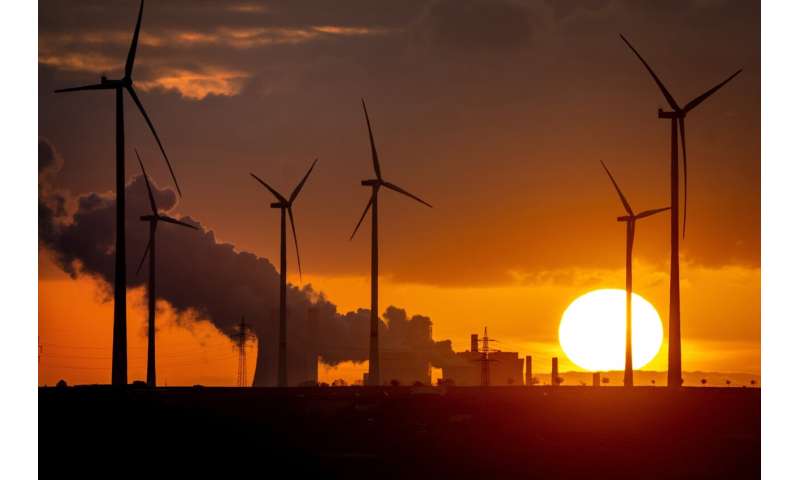
Steam rises from the coal-fired power plant near wind turbines in Niederaussem, Germany, as the sun rises on Nov. 2, 2022. Germany is shutting down its last three nuclear power plants on Saturday, April 15, 2023, as part of an energy transition agreed by successive governments. Critics have warned that without nuclear power, Germany will have to rely on dirty coal and gas plants for energy during periods of overcast but calm weather. Credit: AP Photo/Michael Probst, File
Campaigners like Vent have now shifted their focus to nearby facilities that process nuclear fuel for reactors elsewhere in Europe.
"We need to stop enriching uranium," he said. "We need to stop producing fuel rods for all the nuclear plants outside Germany."
© 2023 The Associated Press. All rights reserved. This material may not be published, broadcast, rewritten or redistributed without permission.


















